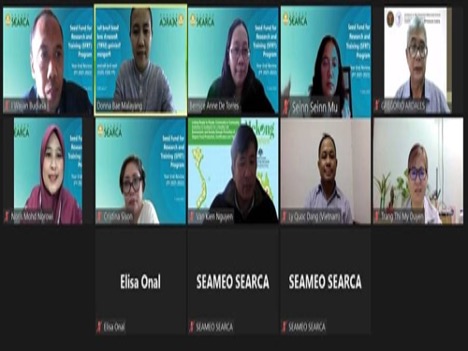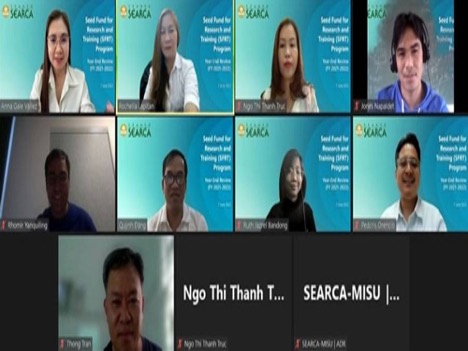
Breakout Room 2 Sub-themes: Climate Change, Biodiversity, Ecosystem, Forestry, Rural Community, Renewable Energy (Biogas), and Free Trade. CONTRIBUTED PHOTO
BY LEANDER C. DOMINGO
LON BAÑOS, Laguna (June 30)—The University of the Philippines Los Baños (UPLB)-based Southeast Asian Regional Center for Graduate Study and Research in Agriculture (Searca) said it has 15 grantees of its Seed Fund for Research and Training (SFRT) program.
Searca Director Dr. Glenn Gregorio said the SFRT is one of the support programs offered by the center which aims to provide start-up funds to researchers and scientists in the Southeast Asian (SEA) region.
He explained that these grantees are those who want to make significant contributions to research, development, and knowledge dissemination but are hindered due to lack of funds.
Gregorio said the SFRT program also seeks to expand Searca’s reach in the areas of research, capacity building, and knowledge contribution to Inclusive and Sustainable Agricultural and Rural Development in the region.
Searca has recorded at least 113 grantees since the first SFRT grants in 2005-2006 up to 2019-2020.
During the June 7 virtual gathering and year-end review, the participating grantees include one each from Indonesia, Malaysia, Myanmar, five from the Philippines and seven from Vietnam.
They presented their research results, the planned dissemination and use of the results, other follow-up activities, and opportunities for post-SFRT grant.
Searca said these grantees and their teams had implemented their respective projects under extremely challenging circumstances and the pandemic which has resulted in changes in plans, methodologies, timelines, among others, and the pace with which projects were conducted.
It also said the review aimed to ensure sustainability and uptake of the gains of the SFRT projects as well as sustain project gains beyond the grant period.
During the virtual gathering Dr. Pedcris Orencio, Program Head of the Research and Thought Leadership Department (RTLD), discussed the assessment of the research projects through monitoring, evaluation, and learning (MEL) process and how the results of SFRT grant implementation could lead to outputs, outcomes, and impacts.
Orencio highlighted the obligation of the researchers to create knowledge and to achieve the initially determined goals and desired impacts for development through the various research activities they undertake.

He said the results of the research projects were presented through two sub-themes: for breakout room one, topics about youth, agriculture, education, social impacts, value chain, food, nutrition, and food security were clustered; and in breakout room two, topics focusing on climate change, biodiversity, ecosystem, forestry, rural community, renewable energy, and free trade.
Searca said another important aspect of the SFRT program is the use of the information system (IS) with the principal objective of assisting with effective management of the grant through a computerized database.
Jaymark Warren Dia, Searca Unit Head of the Management Information Systems Unit (MISU) was represented by Renz Tabadero who reintroduced the Grants Information System (IS) and had a demonstration of the different functions and features of the IS.
The Grants IS houses both the SFRT and Travel Grants Program and that the latest version of the information system is more secure and consistent with the Searca’s IS in terms of user interface (UI), according to Searca.
Monalinda Cadiz, program specialist of Searca’s Applied Knowledge Resources Unit, discussed the Center’s publication process, publication formats, and the requirements for each.
Cadiz noted that SFRT grant outputs are generally published under the discussion paper series and with policy implications highlighted in policy briefs, other formats such as monographs and Asian Journal of Agriculture and Development articles were included as well in the presentation which provided clarity to the grantees’ concerns on their outputs and their publication.
Rochella Lapitan and Donna Bae Malayang facilitated the interactive evaluation of the SFRT IS using Mentimeter with 15 questions prepared to get the impressions, comments, and suggestions of the grantees when it comes to their hands-on experiences on the use of the SFRT IS.
Lapitan said the evaluation brought out the grantees’ view on the IS’s relevance, usefulness, functions and features, and user-friendliness and to further improve the IS, suggestions were also gathered from the participants.
She said the decision-making processes in the grant management system depend heavily on the amount and quality of information that is made available within the system.
Searca said the whole event provided useful insights for the SFRT Program in moving forward with the plans and activities for the next fiscal year 2022-2023.
The discussion also included enhancement of the current guidelines, strict implementation and use of the Grants IS, completion of the remaining SFRT publications, developing the monitoring and evaluation (M&E) tools and strengthening M&E visits to the project sites to assess the progress and identify bottlenecks in implementation.
